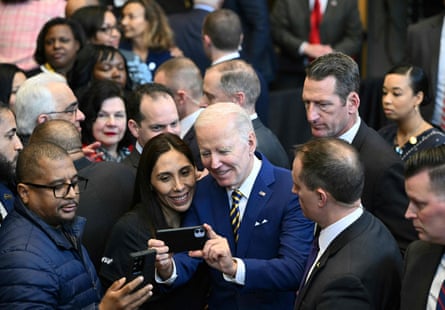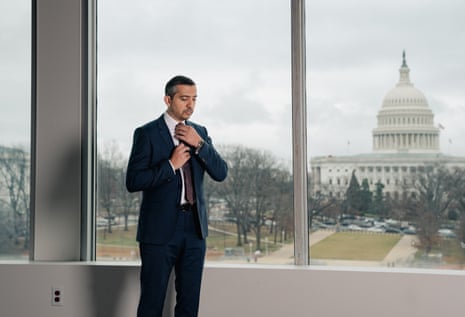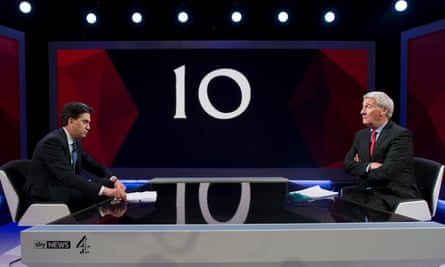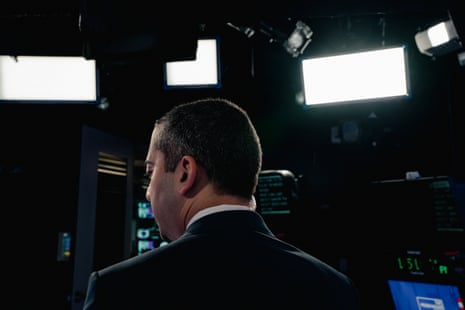‘Biden’s the most impressive president of my lifetime’: Mehdi Hasan on Fox News, tough questions and post-Trump politics
The progressive journalist praises the bluntness of British colleagues and say Mehdi Hasan hosts weekly shows on MSNBC and Peacock. (Shuran Hu
One evening this month on cable television, Mehdi Hasan interviewed Ilhan Omar, who had just been ousted from a House of Representatives panel by Republicans still worshipping at Donald Trump’s altar of intolerance.
The significance of the moment was not lost on Hasan.
“When I was growing up, I never imagined I’d see, on primetime, a Muslim host interviewing a Muslim politician. Tonight, I did the interview,” the 43-year-old tweeted afterwards. “I also never thought I’d see double standards on terrorism bluntly addressed on primetime, but tonight I got to address it. Thanks @MSNBC.”
For those who criticise the American news media as too white, too Christian, too complacent, too inward looking, too pompous (“democracy dies in darkness”), too prone to herd mentality and too deferential to authority, Hasan has come along in the nick of time.
He is a British-born Muslim of Indian descent, anti-establishment muckraker and unabashed lefty with a bias towards democracy. As a former columnist and podcaster at the Intercept, and ex-presenter on Al Jazeera English, he used to worry that MSNBC would find him too edgy, too iconoclastic. But he says the network has been entirely supportive: he hosts weekly shows on MSNBC and NBC’s streaming channel Peacock.
One explanation is that, unlike shock jocks, bomb throwers and social media stars on the right, his show undeniably does substance. During the US military withdrawal from Afghanistan, it featured the Afghan perspective at length. When the war in Ukraine erupted, Hasan offered a 10-minute monologue about the fascist philosopher who informs Vladimir Putin’s worldview. After the police killing of Tyre Nichols, an African American man in Memphis, he discussed critical race theory and policing with two leading academics.
Clearly, Hasan is not afraid to be an outlier. For one thing, he is personally opposed to abortion, though he condemned last year’s overturning of Roe v Wade and believes the law should uphold a woman’s right to choose. For another, he is still fastidious about taking precautions to avoid the coronavirus even as nearly everyone else seems to have thrown caution to the winds.

“My wife and I and our kids, we feel like Will Smith in I Am Legend: we’re the last people still masking in our friends’ circles,” he explains to the Guardian through a face mask in his glass-walled office on Capitol Hill in Washington. “What Americans aren’t being told, sadly, is that most experts in the field don’t agree with the media, Congress, the White House on this. This is a disease that every study shows will increase your chance of a heart attack, dementia, a stroke, diabetes, not to mention long Covid itself, brain fog, all the other issues. Why would I want to get that?”
And unlike some on the left, he speaks about Joe Biden with the zeal of a convert. “I met someone recently who’s like, ‘Well, what’s he done? Joe Biden’s done nothing.’ There’s this fashionable view: completely untrue. Joe Biden has done a lot, more than any president since LBJ [Lyndon Baines Johnson], some might say since [Franklin] Roosevelt.”
During the 2020 Democratic primary election, Hasan, still at the Intercept, was more sympathetic to the progressive senators Bernie Sanders and Elizabeth Warren. “I was a big critic of Biden. I didn’t think he would be a transformative president. I didn’t think he would change things substantively and yet he did surprise me. He was much more open to the Bernie Sanders agenda. A lot of what he did was what the left wanted him to do.”
Biden’s go-big legislative victories have included coronavirus relief, a bipartisan infrastructure law and tax and spending measures that help to address the climate crisis. Hasan is critical of his handling of the pandemic but believes that he was right to end America’s longest war in Afghanistan and has struck the right balance on Ukraine.
“I never imagined I would say this – I was born in 1979 – I think he’s the most impressive president of my lifetime. Now, you might say that’s a low bar compared to Ronald Reagan, George W Bush, Donald Trump, but even compared to the two Democrats who are semi-worshipped by some in their party, Bill Clinton and Barack Obama, I think Biden objectively – on paper a list of achievements – has done more.”

Hasan’s budding talent for argument was watered at the Oxford Union in the UK; a 2021 profile of him in the Columbia Journalism Review was headlined “The Debater”. When he told friends he was working on a book titled Win Every Argument, they assured him it was the one he was born to write. “I guess for good or bad, I’m identified with arguing and debating. I say in the book: I’ve been doing it all my life. I now get paid to do it, which is great.”
You might object that we already have too much argument in America. In 2004, on the CNN talkshow Crossfire, the comedian Jon Stewart memorably upbraided the hosts, Paul Begala and Tucker Carlson, for “hurting America” by stoking divisiveness. But Hasan contends that you cannot have a healthy democracy without “good faith” debate, that a good argument is actually fun – and that anyone can do it.
He has advice for political interviewers, too. Don’t ask seven different questions about seven topics, which allow a politician to dodge; follow up instead. Prepare, research and “show your receipts”. Hasan’s Twitter homepage has a pinned tweet, a video clip from his Al Jazeera days in which he eviscerates Donald Trump’s campaign adviser Steven Rogers, and the words: “Hey US media folks, here, I would argue immodestly, is how you interview a Trump supporter on Trump’s lies.”
So what if he got to interview Trump himself? Hasan says: “Donald Trump has this art called ‘Gish Galloping’, this idea that you overwhelm your opponent with bullshit, nonsense, lies over and over again at such a rapid pace that your opponent doesn’t have the ability to stop and factcheck them in real time and gets overwhelmed. Whether Trump does this wittingly or unwittingly, who knows? But he does it. He’s a master of it.

“There are tactics that you can use. You break it down, you don’t budge. When someone is hitting you with non-stop nonsense, don’t be distracted. Don’t go with the way they want to go. Stay put. Make clear what’s going on. Call out the tactic. Say: ‘We know what you’re doing.’ Make everyone aware of what’s going on. I always talk about breaking the fourth wall. Make very clear this is a bullshit strategy: you’re trying to overwhelm me with bullshit.”
He adds: “Trump throws 100 lies at you. You can’t rebut 100 lies; you can’t rebut 99 lies. So what you do is just pick one lie and take that apart, and that becomes a symbol for all the other 99 lies, because Trump wants you to be distracted by 100 because he knows he can’t defend any of those 100 individually.”
In a chapter titled “Beware of the Gish Galloper”, Hasan writes admiringly about what he regards as Trump’s toughest interview to date. It was in 2020 with Jonathan Swan, then of Axios and also an outsider-insider: an Australian immigrant whose relentless questioning contrasted with many – though not all – American interviewers.
Hasan, who in Britain worked for ITN and the New Statesman magazine among others, comments: “I have often found it weird that the United States of America, which was created in revolution against British state power, against the idea of a ruling class and the idea of bowing your knee or head, is in some ways more deferential to people in power than the UK currently is.
“I’m a big critic of the British media, especially the rightwing tabloid press, but when it comes to interviews I wonder what the US reaction would be if Jeremy Paxman, John Humphrys, Andrew Neil, Jon Snow parachuted into US newsrooms and started conducting interviews. It’s no coincidence that one of the big takedowns of [White House press secretary] Sean Spicer during the Trump years came from Emily Maitlis on the BBC. He had to go abroad to get taken apart. It didn’t happen necessarily in the briefing room always.”
He continues: “I also think there’s a cultural thing and it doesn’t reflect well on us as Brits. We’re blunter, we’re ruder, weirdly we’re less stuck on etiquette. We’re the ones supposed to be the stiff upper lip; actually, no. There is an American political culture which is: that’s too rude, don’t go there, that’s seen as crossing a line. Some of those conventions need to be broken.

“The silver lining of Trump is he forced a lot of reporters and journalists to say, ‘Oh, crap, we can’t hide behind these conventions. It doesn’t matter that he’s the president of the United States. He’s also a serial liar and we need to say that.’ Towards the end of the Trump era, hats off to some in the US, we’re starting to use the l-word (liar), we’re starting to use the r-word (racist) and now in 2023 some people start to use the f-word (fascist). Three words I’ve been using for a long time.”
But that irreverence and scepticism should apply to the American media itself. Hasan reckons that Rupert Murdoch’s Fox News has been given too much of an easy ride considering its role in transforming the Republican party into a vessel of Trump’s crude populism and disdain for reality. Hosts such as Tucker Carlson and Sean Hannity trade in fear, rage, paranoia and culture wars.
He comments: “I won’t say Fox ‘News’ because why should I play along with this conceit? It is not a news channel. It is a propaganda arm of the Republican party. It is a booster of white supremacy and conspiracy. What it did in the pandemic is unforgivable. I, for one, will never forgive the people who ran Fox through the pandemic. I don’t know how many Fox viewers suffered because they believe the anti-vax ivermectin nonsense that they were fed night after night by primetime hosts. The Murdochs have a lot to answer for when it comes to the degradation of our democracy and our media.”
after newsletter promotion
He vehemently rejects the common notion that cable consists of MSNBC and Fox News as left-right mirrors of each other with CNN sitting somewhere in the middle. “This is a news organisation. We’re in the newsroom. There are people calling up sources. There is a standards team that goes through my scripts. There are rules on what I can and can’t say. Tucker Carlson on Fox this week used George Floyd’s death as a punchline. If I used the death of a conservative white man as a punchline, I would probably be pulled off air, and rightly so, but they don’t have those standards over at Fox because it’s not a news organisation. We’re going to have to rethink the way we approach this.”

You cannot understand Trump, Florida’s Governor Ron DeSantis or Covid denialism unless you understand Fox, Hasan contends. “All roads lead back to Fox when it comes to the modern right. You have to understand what they created, what they enabled, what they provided cover for. If you want to understand why American democracy is under threat, the Fox narrative is part of that story. You can’t turn your eyes away from it because they’re fellow media organisations. They’ve been coddled for far too long by the rest of the media.”
One popular subject on Fox News is cancel culture, the notion that leftwing extremists have taken over university campuses and other institutions and silenced anyone who disagrees with progressive orthodoxy. This has become a favourite theme of the “liberal” comedian Bill Maher, who has a weekly show on HBO, and who recently compared the “woke revolution” to Chairman Mao’s cultural takeover in China.
Hasan says: “Are there excesses? Yes. Do people sometimes get fired when they shouldn’t? Yes. Do people self-censor? Yes. But that’s been like that for years. I don’t buy this moral panic from the right and some in the centre that everyone’s living in fear of saying the wrong thing. The great irony is, if you are in fear of saying the wrong thing it’s the wrong thing that rightwingers don’t like, not leftwingers.
“The biggest cancel culture brigade in this country is the modern American right. They’re the ones banning books. They’re the ones preventing the teaching of history. They’re the ones purging the Republican party of any kind of moderates, as if a woman called Cheney is a moderate, but she’s out, too. What do they say about the modern GOP? Every accusation is a confession.
“I can’t believe you would look at America in 2023 where you have open racists running for office, you have members of Congress going to conferences of Holocaust deniers, and say, ‘Oh, this is the climate in which everyone’s censored.’ Are you kidding me? This is the most uncensored American political climate we’ve had for decades.”

Hasan was born in Swindon, Wiltshire, grew up in Harrow, an outer borough of London, and studied at Oxford University. He married a Texan – they have two children – and moved to the US in 2015, just as Trump’s comic turn was turning serious. He says he got more “skin in the game” when he became a US citizen in October 2020, a month before Trump lost to Biden in the presidential election.
“I am treated like an American, which is great. Despite all of the cons that we know about in terms of the demonisation of asylum seekers at the southern border and the behaviour of Ice, in terms of political media, public culture, civic life, I’m surprised at how little people have thrown, ‘Well, you’re a Brit’ [at me], especially because I’m following in the footsteps of the likes of Piers Morgan, and no one wants to be reminded of Piers Morgan.
“That was always my fear. Every time there’s a mass shooting, I have to think, how do I condemn this and point out this is an American aberration without sounding like a pompous Piers Morgan? Luckily, I haven’t been treated in that way.”
Hasan, who says the September 11 attacks played a key role in shaping his writing, has also observed a shift in perceptions of what it is to be Muslim in America. More than two decades later, al-Qaida and the Islamic State have faded from the headlines.
“For all the wrong reasons, Muslims are no longer in the news as terrorists and the reason for that is because a lot of white Christians have become the No 1 terrorist threat in this country. That’s not necessarily a good thing. As a Muslim, of course, great not to always be demonised as a terrorist and for Americans to finally realise that terrorists are not conflated with brown men with big beards; terrorists can be people carrying Confederate flags in the capitol of our country.”
But like so much else in the Republican party’s id, Trump brought its Islamophobia to the surface, saying the quiet parts through a bullhorn, for example by proposing a “Muslim ban”. His acolytes have pushed the “great replacement” theory, warned of an “Islamic invasion” and demanded that Muslim members of Congress swear on a Bible rather than a Koran when taking their oaths.

With Trump running for president again, the danger is far from passed. Hasan says: “Literally 48 hours ago, I was on a WhatsApp group where people were joking about ‘See you in the camps’. That joke still does the rounds – a very dark black humour amongst Muslim communities – especially because Trump hasn’t gone away, especially because the Republican party has become more Trumpy.
“You might say, oh, that’s paranoia, but if Donald Trump is re-elected as president and in January 2025 is sworn in, all bets are off what will happen to minorities, and in particular to my community, because whatever guardrails and adults in the room and limits on Trump’s behaviour you thought there were in the first term, they’re all gone. Absolutely nonexistent – anyone who thinks they exist is dreaming.”
Trump remains an existential threat to democracy and fabric of American society, Hasan argues. “We have kids in high schools shouting abuse at Latino and Black players from the crowd because they’ve got permission from the former president of the United States.
“What he’s done to an entire generation of young conservatives who are much more vicious, crass, boorish, misogynistic, racist – countless books will be written going forward on the damage that he’s done to our public culture. And don’t even get me started on supreme court. Donald Trump could be hit by a bus tomorrow, he already left his mark on the judiciary. That’s going to be with us for decades to come.”
Hasan has kept his mask on throughout our interview of nearly two hours but also followed his own book’s advice of maintaining eye contact from beneath his thick brows. He is about to take the book on tour, which he admits could prove the ultimate test of his Covid defences. With the 2024 election under way, he intends to keep warning against short memories and the danger of normalising Trump or other extremist Republicans. That he has the platform to do so is something he regards as a privilege, like when your dad hands you the keys to his expensive car.
“I feel like, ‘Wow, they gave me the keys to go out and drive and I’ve got to be really careful with the car, but I’m also got to enjoy it and do what I want to do and make the most of it.’ That’s constantly what I’m thinking. Otherwise I wouldn’t do what I do, I would go and do something else. There would be no point if I wasn’t constantly thinking about how it’s being received and what I’m trying to achieve. I’m trying to win an argument every night. I’m trying to say: this is what I believe. You don’t have to agree with me, but let me make the case.”
Win Every Argument by Mehdi Hasan is published by Henry Holt in the US and Pan Macmillan in the UK. To support The Guardian and Observer, order your copy at guardianbookshop.com. Delivery charges may apply.
... as 2023 gathers pace, we have a small favour to ask. A new year means new opportunities, and we're hoping this year gives rise to some much-needed stability and progress. Whatever happens, the Guardian will be there, providing clarity and fearless, independent reporting from around the world, 24/7.
Times are tough, and we know not everyone is in a position to pay for news. But as we’re reader-funded, we rely on the ongoing generosity of those who can afford it. This vital support means millions can continue to read reliable reporting on the events shaping our world. Will you invest in the Guardian this year?
Unlike many others, we have no billionaire owner, meaning we can fearlessly chase the truth and report it with integrity. 2023 will be no different; we will work with trademark determination and passion to bring you journalism that’s always free from commercial or political interference. No one edits our editor or diverts our attention from what’s most important.
With your support, we’ll continue to keep Guardian journalism open and free for everyone to read. When access to information is made equal, greater numbers of people can understand global events and their impact on people and communities. Together, we can demand better from the powerful and fight for democracy.
Whether you give a little or a lot, your funding will power our reporting for the years to come. If you can, please support us on a monthly basis from just £2. It takes less than a minute to set up, and you can rest assured that you’re making a big im





No comments:
Post a Comment